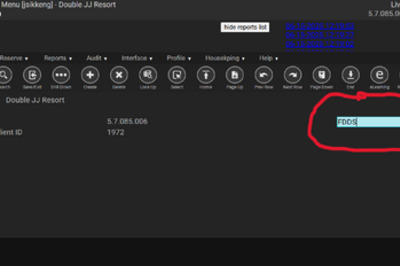
views
New Delhi: Former Army Chief General VK Singh, who was an active member of veteran social activist Anna Hazare's anti-corruption movement made his foray into politics on Sunday as he joined the Bharatiya Janata Party. He may also contest the general elections from a Haryana or Rajasthan seat. CNN-IBN's Bhupendra Chaubey talks to Kunal Verma, who co-authored General VK Singh's autobiography, Courage & Conviction (Aleph) about General Singh joining the BJP and other related issues including the latest notice sent by the former Army Chief to the Home Minister accusing him of abetting treason and sedition by shielding various parties that came together to malign the General.
Following is the transcipt of the interview:
Question: By finally taking the political plunge, what does VKS bring to the table?
Answer: I think in India this move was long overdue. Somehow, even though General Carriapa had flirted with the Shiv Sena in the '50s there was this ridiculous belief that an 'apolitical' Armed Forces meant that Chiefs and senior officers after retirement were holy cows who should not join any political party. In the six decades since Independence, the Armed Forces have spiraled downwards not just in protocol but have been at the receiving end in the evolving civil-military equation that we settled for based on Prime Minister Nehru's philosophy. To have a political 'fixer' as his Defence Minister in the immediate aftermath of Independence and Partition, the political canvas for the Armed Forces had been clearly defined right at the start. Ever since, all that senior officers, especially after retirement, did was to belly ache and moan about the state of affairs with their heads in the sand. General VK Singh and a host of other former top brass have broken the glass ceiling. VKS can bring to the table an uncorrupted and professional mind dealing with the vexatious issues of national security, civil-military relationship, democratic governance and a nationalistic response to these issues.
Question: Does this (a former Chief joining politics) have any negative impact on the Armed Forces, more specifically on the Army?
Answer: How is it any different from former Chief's being appointed Governors? In some cases - not all, for we have had some excellent people who have done extremely well - these gentlemen have been appointed with the sole intention of carrying the ruling party's agenda forward. If that is not cynical politics, I don't know what is. For the rank and file still serving in the Forces, at least they will now know that there are people who will speak up for them in the so called all pervasive 'system'. Just how successful this move will be depends on various factors. The most important will be the defining of roles for these officers in the immediate future. The larger implications must be understood by the political parties without giving in to short term temptations. This is a breed of highly competent and professional people. You definitely do not want to make them into decorated Christmas trees that allow parties to pay lip service to National Security issues.
On the other hand, I also think its important for these ex-Servicemen to realize that having attained a certain rank in the Army, Air Force or Navy, things will automatically fall into place for them. In the political hierarchy of whichever organization they choose to join, they will have to carve out their own place, competing with people from other equally competent walks of life. It'll be interesting to see how things pan out - these officers must realize they are the new Standard Bearers for the Armed Forces and it will take a lot of maturity on all sides, especially when you are under the constant scrutiny of our new 24x7 media.
Question: As the co-author of VKS's autobiography, what according to you are the biggest take away for the reader?
Answer: Every book has a different impact on different individuals, so its hard to quantify any one or more 'take away' as such. Even though Courage & Conviction was an autobiography, I thought one of the most important factors that the book dealt with was the General's putting down the manner in which the Ministry of Defence has virtually taken the sting out of our Armed Forces. It's not just the Army, the entire system has virtually come apart under the watch of the UPA over the last one decade. The sheer professional ability of our officers and men have helped to carry the can, else the elements would have hit the fan much earlier. Personally I was a bit surprised that while most reviewers focused of less important things, this did not get enough attention. The entire modus operandi of how things work with the money being 'unspent' is all there. Various people have warned of the hydra-headed monster that the MOD has become, but just how bad the situation is becomes obvious once one reads what is actually happening from the perspective of a man who was the Chief of the Indian Army.
I also feel that the General was much too soft of the RM, with whom he shared a good relationship and who he has always described as a 'good man'. I think what the UPA Government has done to the Armed Forces and the country as a whole through their inaction and through various scams is deplorable. For most people, this inaction and unaccountability is the greatest betrayal - governments are elected and people chosen because we as the people want them to govern. They are not elected to serve any one family and fatten their own pockets, or also run away from responsibility. Having said that, I also feel that the Opposition also is equally responsible for the mess we are in. They just did not seem to realize how things were eroding away. They did precious little to protect some of the most important institutions when they came under the hammer. Hopefully, the injection of military minds into the political arena will help bridge this huge gap in our polity.
Question: You have also worked extremely closely with the IAF and the Navy and also made the film on the LCA. From your perspective, as someone who is outside the system and yet so closely involved, how bad is the situation really? Or is it a case of too much media hype combined with the shrill voices of ex-Servicemen?
Answer: First, let's look at the positive part. We have people this country should really be proud of. The kind of dedication and work that was being put into various projects a decade ago had to be seen to be believed. Not just the LCA, I was also fortunate enough to see the work being done on warships like INS Delhi and INS Mysore. Again, I was lucky enough to film the Kargil War with the Army and even film fighter sorties over Tololing and Tiger Hill when we later made the film on the IAF, Aakash Yodha. The cutting edge of our Armed Forces have always been outstanding - be they airmen, sailors or soldiers. We have youngsters who will always lead from the front, no matter what. The two boys rushing into a burning battery chamber to evacuate everyone in a submarine and paying with their lives does not surprise me. What does horrify me, however, is that when we already have such difficult boundaries to protect where even the elements of nature stretch you to the limit, how can we as a people compound the problem by letting vested interests and power brokers highjack the system to the extent that we lose precious lives. We make a big noise for a few days, but then nothing happens. I challenge anyone to tell me the names of the two boys who were beheaded on the LOC, or the last pilot who was killed in an air crash, or even the names of the two officers killed last week. To come back to VKS, when he started to raise these issues, it was a lobby of handpicked retired generals who day after day denounced him on television and in the print media. Most of these officers had suspect professional reputations while in Service. There are thousands of retired people out there, but the television channels just kept recycling the same half a dozen odd people. It was ludicrous.
Question: Your involvement with VKS started with the NE Trilogy. What were you people trying to do?
Answer: I had been making films on wildlife and the Armed Forces for more than two decades and a lot of our shooting was in the Northeast. It was obvious there was a huge void, what I call 'blanks on the map' when it came to our people's understanding of the people and the entire Northeastern region. We were between projects, and we decided to start photographing the region. We were also doing the book for Assam Rifles and 3 Corps, which is based in Dimapur. Rakesh Loomba was the Corps Commander and I suggested to him we focus on the region and the local people rather than the military personalities and he backed us to the hilt. VKS then came in as the Eastern Army Commander and we discussed what needed to be done. It was a massive project, and I often wondered then if we had bitten off far more than we could chew. It took four years, but we managed to get to the remotest parts and spend time with people we didn't even know existed. Our objective was to produce a world class trilogy, and then get it across to all our people, both within and outside the Northeast. The General's involvement with virtually every page in the 1300 pages was an eye opener - his commitment and faith in what we were doing was fantastic and despite the fact that no project like this had ever been done before, his support allowed us to achieve most of the objectives we had set for ourselves.
Question: Why did Phase-II fail to get off the ground.
Answer: My co-author, Dipti and I briefed the President and the PM in January 2011 during the Army Day and we told them what we were planning to do. With the Army we then worked out a fairly simple plan - we wanted to translate the trilogy in every Indian language and give each state Government 10,000 sets to distribute to their schools and colleges. As part of Phase I we made 7,000 sets that were distributed within the Army, with the sole intention that the officers and men who serve in the region must have a deeper understanding of the people they were dealing with. VKS took the proposal to the PM. Not once, but time and again. There was no response, even though when we spoke to the PM he had said that the Northeast was very dear to him etc. as he himself was elected from Guwahati or something like that. Frankly, I could never quite believe that the PM could let a project like this pass. Every time there is a horrific incident involving Northeasterners, these guys make all the right sounding noises but they do nothing. Once VKS was no longer 'kosher', I guess the entire project was collateral damage. The Indian Express in its mad desire to get at VKS, promptly front paged it and said it was under scrutiny. That was pure bunkum, but then who can fight the media? I sent them a legal notice which is all that I could afford, both in terms of time and money. They sent me a long winded reply giving me the definition of the word scrutiny, claiming it meant nothing negative. What can you do with people who have an unlimited supply of ink and no scruples.
Question: You talk of the negative role played by the Express Group in particular. How can you justify the General's use of the word 'presstitutes', a term that even drew a rebuke from the Editor's Guild of India. Apart from the much hyped 'coup' story, which were the other 'frame ups' that have been perpetuated by the media? Can you briefly summarize those issues as well.
Answer: I personally felt the General needn't have got provoked by some elements in the media who seem to believe they can cook up anything or imply certain things, perhaps secure in the belief that he has the protective hand of people in power over their head. Certain journalists have been clearly identified who have said and done things which are not even remotely true and a complaint was sent to the Home Minister in November 2013. True to form, despite a reminder a month later, the home Ministry has been as silent as a pet rock. The main offending newspaper then relied on the silence of UPA Government and the ripple effect that would grip the rest of the media and have tried to create more smoke by quoting the former DGMO and the CAS. Just what did the Air Force have to do with a road mobility exercise is something which seems to escape the intelligence of the collective editorial board of the Express. I was on a television panel where the moderator had the biggest culprit on the line. It was funny, the editor of a newspaper group going on about having his fingernails pulled but he would not give up his sources! Forget about the Age issue and the Coup story, there have been endless instances, some of which we dealt with in the book, which are fabricated. J&K, TSD, Panchayat Elections, its all there in black and white. I don't think we'll have to worry about fingernails if the Government did do an inquiry or have to look up dictionaries to figure out the actual meaning of certain words.
As far as the Editor's Guild is concerned, I think the General has pointed out that the main person is the editor of one of the accused groups. To say that the editor who was then in charge no longer works for us is no defence, especially in a matter which is so grave as to mislead a State Assembly. As a media regulatory body, I think they should be more concerned about these issues.
Question: What happened to Tatra? One day it was all over the place, then it went off the air. Who is the main sutradhar in the PMO VKS keeps alluding to? In Courage & Conviction, VK and you have dwelt on the indigenous production of the Bofor's gun. It almost seems ridiculous that the gun was never manufactured in India for almost thirty years after we had paid huge sums as part of the deal for licensed production. It seems almost unbelievable that no one ever looked into this matter until VKS came along. Are there other examples?
Answer: I think the fracas around the DGMOs comments reported in the Indian Express a few days ago give you all the names, if you had any doubts in the first place. Join the dots... the PMO man had a role in Tatra which went off the air the moment front page adds appeared in leading newspapers including the Express. The General refers to them as the 'Chandigarh Think-Tank'. The PM and the RM both rubbished the Express story officially, so which 'highest seat of power' was the Defence Secretary referring to? Some people have been playing the 'spook' game for years now. All this is part of the complaint, which demands action not just against the named press persons but also people within and outside the Government.
DRDO, HAL, various shipyards, they all need to take a real hard look at themselves. Accidents are inevitable, and by their very nature they will undoubtedly happen again. However, what we need is a complete overhaul of the system where everyman working on any project actually feels the pain when someone goes down because we as a nation failed to provide them with the tools to defend us. Today, most scientists measure success by the fact that their own kids managed to get into NASA or some Western Missile Program while they continue to punch their time clocks. Its a vicious cycle, and unless these issues are identified and tackled, we will sink even deeper into the mire.
Question: There was this little band of people who had dug in with VKS during this period - between his retirement from the Army and his joining politics. This included a couple of former Naval Chiefs who were quite vocal in their support for him even during the dark days when the Government of India was throwing the kitchen sink at the General. Any of them plan to follow him into politics as well?
Answer: This 'band of people' is neither a political nor pressure group. They ascertained the facts and stood by the General who was being wronged. There is no question of them following the General into politics. As for VKS's support base, it has always been the Army and I think one can safely say that the junior and mid-ranking level of officers had a lot of respect and faith in him as the Chief. The 'Age extension' nonsense may have cut some ice with civilian audiences but I think all the men knew what was going on. The support that the General received from some people, especially senior retired officers, was fantastic, with some of them even going to court over the issue of 'Institutional Integrity'. That the highest courts in the land chose to look the other way even though the Attorney General committed perjury in court by presenting tampered files, is something they in their wisdom may choose never to answer. For most of us who were around at the time and could see what was happening, it was an issue based fight, more ideological than anything else. I think it is for the General and his team to now identify the people that he needs to chart a path forward.
Question: Ever since VKS's involvement with Anna, there has been this constant covert verbal sniping between the AAP and the General. Considering they are both two major faces of the anti-corruption crusade, why did VKS veer off towards the BJP when the AAP would have seemed to be the more natural choice for him and even, say Kiran Bedi?
Answer: Indulging in anti-corruption rhetoric is one thing and fighting it by staking one's career and even reputation is another thing. While AAP and its 'stalwarts' did the former, the General did the latter. Those who make up AAP today, with the exception of Prashant Bhushan, did not lift a finger to support General VK Singh when he was waging a lonely battle against the combined might of the massively corrupt arms and mines lobbies.When the General retired, there were a lot of people expecting him to plunge into politics. Few realize that it's almost two years now since he hung up his boots. At that stage most of us in the group suggested he spend time looking at various critical issues, for all said and done, life in the Army is quite insulated. To a great extent, he did just that; broader security issues, nuclear and alternate energy, farmers issues, ex Servicemen problems, the entire Jan Morcha business with Anna who was at the time was floundering after Arvind Kejriwal's exit with most of his people. He has expanded on that aspect in the book and he gave it the name 'Reclaiming India'. Strangely, AAP media-hypers went to the extent of humiliating the General for being with Anna Hazare campaign. What is worse, AAP has now put up certain ex-servicemen who have been mouth piece of Congress party and have been denigrating him all the while as candidates for the forthcoming Parliament elections. Nevertheless, to be quite honest, I think we all always wanted AAP to succeed as a political force. This does not mean everyone should join that bandwagon!
Other than co-authoring General Singh's biography, Kunal Verma has also authored of The Long Road to Siachen: The Question Why (Rupa & Co.) and the highly acclaimed Northeast Trilogy apart from a few others. In the last two and a half decades, he has also made many important documentaries, starting with the Project Tiger series in the 1980s to most of the major films on the Indian Armed Forces, including the films on the National Defence Academy (The Standard Bearers), Indian Military Academy (Making of a Warrior) and the Kargil War.
















Comments
0 comment